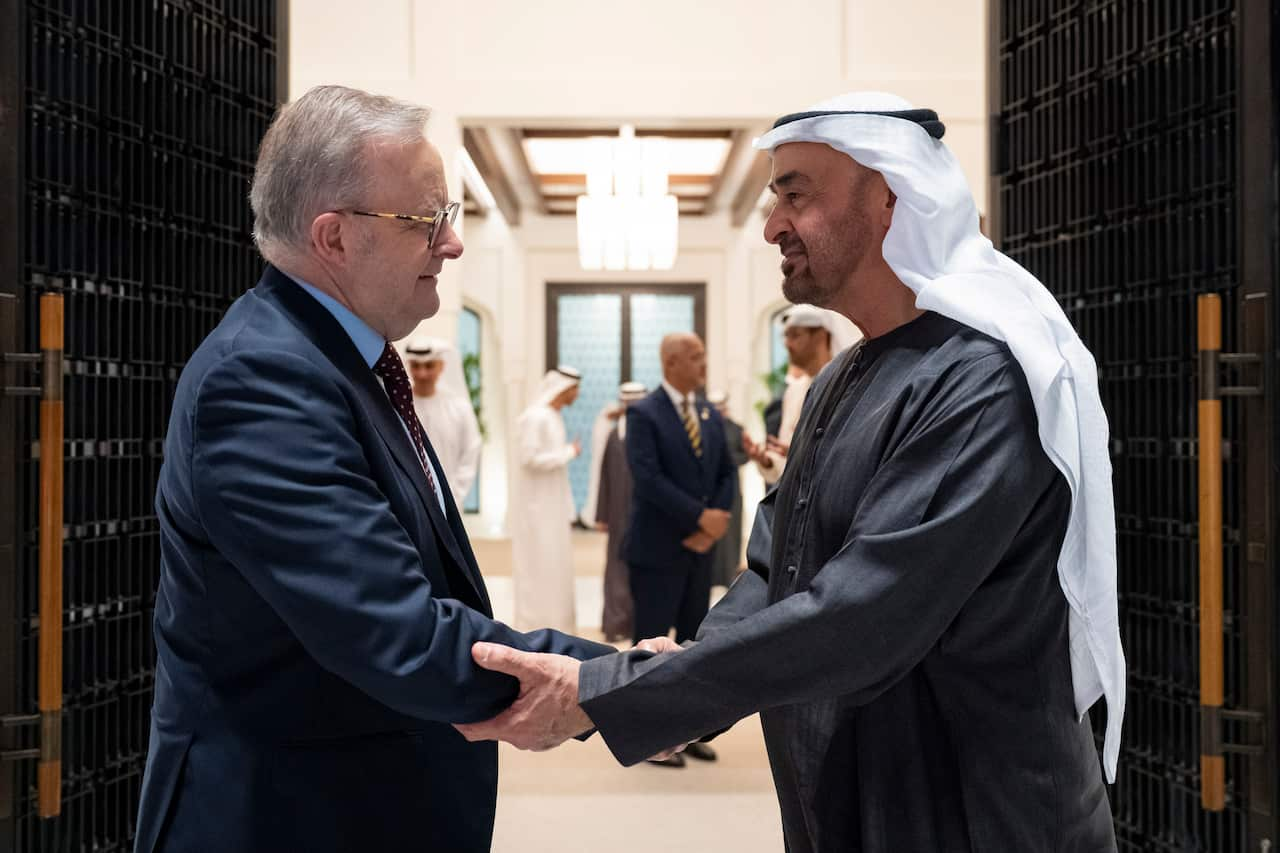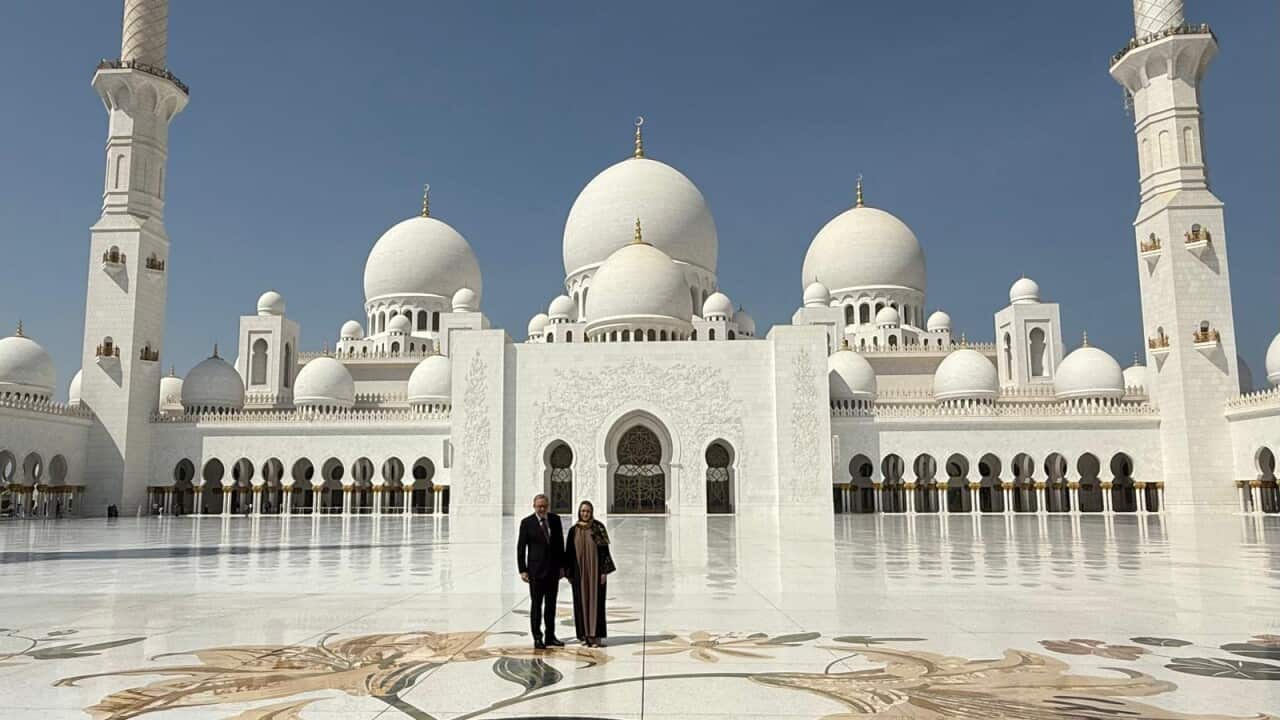As Prime Minister Anthony Albanese crossed the dazzling white courtyard of the Sheikh Zayed Grand Mosque in Abu Dhabi, he was paving a path to the door of the powerful leader of the United Arab Emirates (UAE) and executing a days-long strategy of engagement over the future of the shattered remnants of Gaza.
Just hours after that moment of reflection at the largest Islamic place of worship in the UAE, the White House was thick with anticipation as United States President Donald Trump and Israel's Prime Minister Benjamin Netanyahu addressed the press pack — with no questions taken — to spell out a new plan for peace.
When asked about what role Australia might play in a "day after" scenario if the peace plan works, Albanese was quick to underscore Australia's status as a middle power and one that is far from the conflict in the Middle East.
Foreign policy power play
Last week, Albanese took to the United Nations podium in New York for the first time since being elected. He argued for middle powers to work together to bring global chaos into order, spelling out the potential for those countries to wield more power.
And while not all the countries that strategically confirmed recognition of Palestinian statehood would be defined as middle powers, heavy hitters like the United Kingdom and France were acting in tandem with Australia, Canada, Portugal and a handful of other countries to definitively break with the US and throw their support behind a Palestinian state.
Recognising statehood was Australia's big foreign policy power play in the Gaza space, but going it alone would have barely made a splash.
The wall of so-called "like-minded" Western countries shifting together created something different — momentum.
So Albanese jetted into New York for the UN General Assembly and made Palestinian recognition his first announcement.
On that first day, under a giant framed photo of rippling water, he also met with Jordan's King Abdullah II, and they discussed the two-state solution and what could be achieved at the UN.
Then, as Albanese spoke with an array of world leaders, a conversational thread was unfolding throughout his longest international trip since he first came to power.
The future of Gaza was on the agenda in bilateral talks with France.
French President Emmanuel Macron led the shift to statehood, alongside Saudi Arabia.
In the UK, Prime Minister Keir Starmer told reporters his one-on-one talks with Albanese at 10 Downing Street included forward planning for the region, should a ceasefire be achieved.
Blair describes Albanese as a 'friend'
After both nations moved to recognition, "now we needed to find a way forward to end the fighting, free the hostages and deliver a long-term peace for Palestinians and Israelis alike", a statement from Starmer read.
At Stoke Lodge, the Australian high commissioner's London residence, former Labour leader Tony Blair, the man touted by the White House to help lead a transitional authority in Gaza after a ceasefire, was in deep conversation with Albanese, describing him as a "friend".
Albanese later told reporters he thought Blair could play a "constructive" role; the pair have been in ongoing communication about the conflict.
All these conversations, and many more with Foreign Minister Penny Wong that haven't been listed, have taken place over the last 11 days.
But the outcomes for Australia are unclear.
When Macron revealed discussions about a multinational peacekeeping force in Gaza after the conflict, Albanese said he would give "consideration" to any Australian involvement at the appropriate time.
The question of Australian boots on the ground was "hypothetical", according to Wong.
In the White House joint press conference with Netanyahu, Trump said some countries "foolishly recognised the Palestinian state … but they're really, I think, doing that because they're very tired of what's going on".
That reference reveals the momentum had an impact on Trump's thinking, a concession about the level of conflict fatigue and frustration.
'The right side of history'
Former Australian ambassador to Lebanon Ian Parmeter said the developments show the government made the right decision.
"My assessment is that the Trump 20-point plan vindicates the decision of Australia and several other Western countries to recognise a Palestinian state," Parmeter, currently a research scholar in Middle East Studies at The Australian National University, said.
"Our recognition was well-timed and puts us on the right side of history. It also adds to international pressure on Israel to abide by the Trump plan."
But Parmeter said it was important not to overstate the impact of Australia's actions.
"That said, I have no doubt that Trump had other considerations in mind in producing his plan and pressuring Netanyahu to accept it. Trump doubtless saw an opportunity and decided to go for it big time," he said.
Ben Saul, UN special rapporteur focused on counter terrorism and torture, views the joint international movement on recognition as a significant step towards a resolution.
"Recognition by Australia and others undoubtedly intensified pressure on an isolated US to break with the failed status quo in Palestine and insist that Israel compromise to accept the Trump peace plan," he said.
But Saul also warned there are many unknowns about how the Palestinian military group Hamas and the Palestinian Authority will now fulfil their obligations.
"Elements of the plan positively reflect global opinion, but there are also major international law red flags, including inadequate respect for self-determination and statehood, a lack of concrete timeframes and benchmarks, continued partial occupation by Israel, a lack of United Nations supervision, and no justice and accountability," he said.
The stakes are high.
"If the plan is implemented in full, it will be the biggest step forward in Middle East peacemaking since the Oslo Accords. Trump's Nobel stocks will rise enormously," Parmeter said.
Trump 'uniquely placed' to end Gaza war
In an exclusive interview with SBS News in New York, Wong considered the question of Trump's Nobel status.
When asked if she thought Trump deserved the Nobel Peace Prize, Wong responded: "What I can say is no one has been able to end this war in Gaza, and he is uniquely placed to be able to end the war in Gaza and set the region on a path to peace, and I hope he is able to do that."
For Albanese, the critical shift in laying the groundwork for the statehood push was the movement from Arab states and the role the broader Middle East would play.
The talks with UAE President Sheikh Mohamed bin Zayed Al Nahyan in Abu Dhabi are significant, even if they took place during a refuelling stop for Albanese.

In a joint statement released after the hour-long talks, the pair appealed for a ceasefire, the release of hostages and aid to be delivered.
They also stressed the "urgent need to advance a serious political horizon for the resumption of negotiations to achieve a comprehensive peace based on the two-state solution, and lasting peace and security for the State of Israel and the State of Palestine".
"In this regard, the UAE welcomed Australia's role in building new global momentum towards this goal and its decision to recognise the State of Palestine on 21 September 2025," the joint statement read.
Albanese will have his own White House moment in less than a month.
Parmeter said, if it works, the substance of the new Trump-led peace plan cannot be understated.
"The plan addresses all the issues that will need to be resolved in order to end the Gaza conflict.
"But, given this is the Middle East, don't put money on that yet."
For the latest from SBS News, download our app and subscribe to our newsletter.

